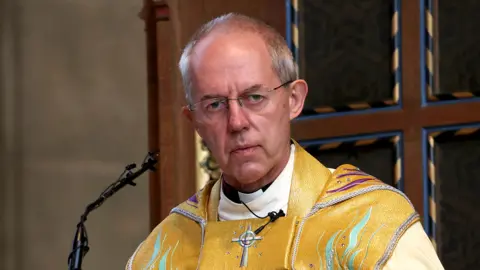Archbishops of Canterbury and York urge caution on extremism redefinition
 Getty Images
Getty ImagesThe Archbishops of Canterbury and York have criticised Michael Gove's planned redefinition of extremism.
Justin Welby and Stephen Cottrell said the response to what Rishi Sunak has called a shocking rise in extremism, "risks vilifying the wrong people" and creating "more division".
The pair added it threatened freedom of speech and worship.
A government spokeswoman said it would ensure no "extremist organisations or individuals" were given a platform.
Speaking to BBC Radio 4's Today programme, Mr Welby said extremism happened in all faiths and was always changing.
"It's a general principle that extremism is a shapeshifter," he said. "It's always moving around and changing itself, and it happens in all sorts of faith groups and it is a very dangerous problem indeed."
He noted the rise in antisemitism and Islamaphobic behaviour and the fear within those communities, and agreed that extremism was a problem that needed to be addressed.
"The role of government is essential to preserve security, but there are different ways of getting to an understanding of what we mean by extremism, and it being decided by government without drawing in the groups and networks across the country is where the mistake lies."
The overall tone of political discussion in the UK was "extremely concerning" he said.
The government currently defines extremism as "vocal or active opposition to fundamental British values, including democracy, the rule of law, individual liberty and mutual respect and tolerance of different faiths and beliefs".
Mr Gove is expected to set out a new official definition of extremism on Thursday, which will be used by the government to cut ties or funding to any groups deemed to have crossed the line.
On Sunday, he warned some pro-Palestinian events "have been organised by extremist organisations".
It follows a statement by Rishi Sunak at the start of the month in which he said the UK must face down extremists undermining British democracy.
But the archbishops believe the government risks disproportionately targeting Muslim communities.
In a statement, Mr Welby - who has held talks with Mr Gove about the plans - and Mr Cottrell urged the government to "reconsider and consult far more widely with all those affected".
"Instead of providing clarity or striking a conciliatory tone, we think labelling a multi-faceted problem as hateful extremism may instead vilify the wrong people and risk yet more division," they said.
"The new definition being proposed not only inadvertently threatens freedom of speech, but also the right to worship and peaceful protest - things that have been hard won and form the fabric of a civilised society.
"Crucially, it risks disproportionately targeting Muslim communities, who are already experiencing rising levels of hate and abuse."
The Church of England has offered to work with the government to help communities discuss the plans - something the archbishops said would be fulfilling a historic role.
A government spokeswoman said: "We are taking action to ensure that no extremist organisations or individuals are being given a platform by their actions and interactions with government."
Ministers have also announced they will appoint a new independent adviser on anti-Muslim hatred.
However, one man thought to be in the running for the job, Fiyaz Mughal, says he withdrew before being appointed after suffering a torrent of abuse.